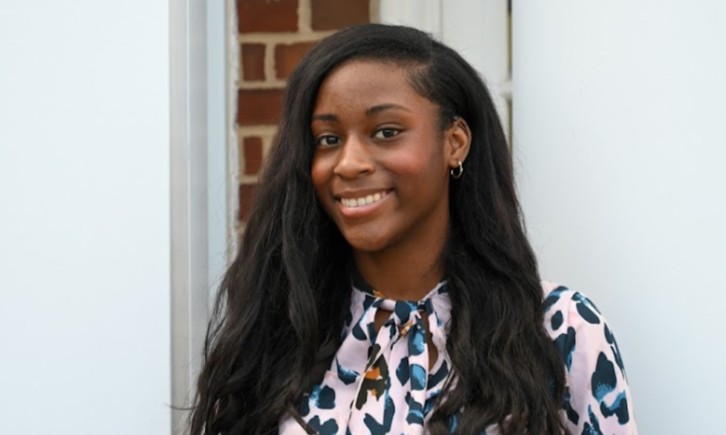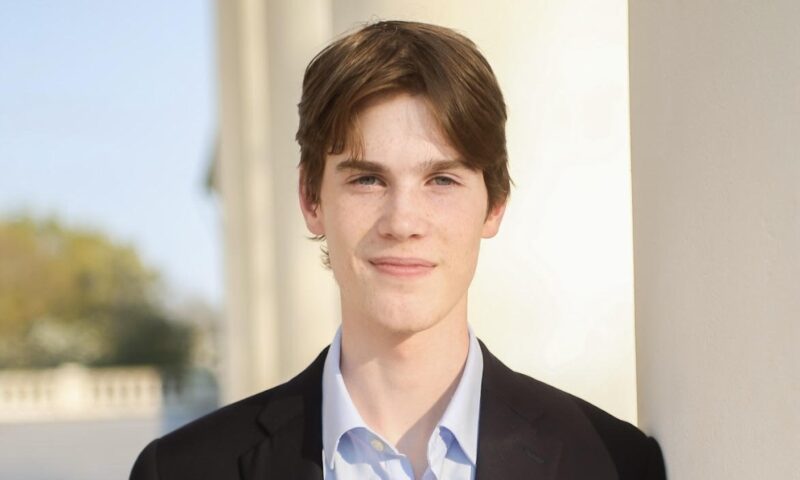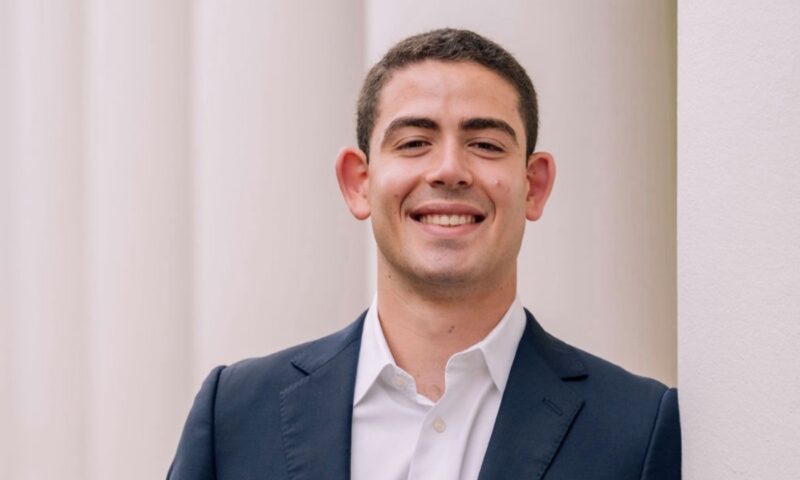David Miron says that aside from the challenges of learning during the pandemic last year, time management has been the most the demanding part of Comm School life for the Tarzana, CA, native. But judging by his engagement across and beyond Grounds, you’d never know it.
“I’ve been involved with the social entrepreneurship community through SEED Consulting, doing an independent study on emerging markets private equity, some nonprofit work, and volunteering, and with the music community, student bands, University Records, and the First Year Players pit orchestra,” says the Finance concentrator. He’s also a double major in Archaeology.
But he seems to have always thrived on having widespread interests and discovering solutions to problems that required an expansive view. As a high school student, he enjoyed his history, science, comparative government, and economics classes because of the way they analyzed the cause and effect of pertinent issues. The discussions led him to take an interest in nonprofits and social entrepreneurship as a vehicle for approaching the world’s challenges.
“Coming to UVA, applying to McIntire seemed like a great way to continue this education; to explore novel ways to problem solve; and to build upon my interest in strategy and investigate how businesses, nonprofits, and financial vehicles operate, ultimately to see how they might be instruments of social change and innovation,” Miron says, explaining that McIntire prerequisite courses were eye-opening in this regard. “I appreciated both the structured approach of Accounting and the creativity inherent in Entrepreneurship, and my experience in these courses made me excited to keep learning, especially within a close-knit community, where I could really get to know my professors and classmates.”
He would have ample opportunity for those types of interactions, finding that the transition from learning on his own to undertaking multiple group projects at McIntire required a great deal of communication to coordinate his active schedule with the equally packed ones of his classmates. But he says the results of that effort have helped prepare him for the future. “I ultimately found this to be great practice for the corporate world, where workflows are built around teaming and being able to prioritize and manage a schedule is so important.”
In August, Miron will head back to Bain & Company in San Francisco, where he interned last summer, to take on the role of Associate Consultant. He says that he’ll come to that position with an important lesson he’s learned at the Comm School: Business does not exist in a vacuum.
“Context is crucial to thoroughly understanding any business problem, and crucial to a consulting career. From learning PEST and SWOT analysis in the first weeks of the Integrated Core Experience, to placing businesses in a global context and understanding how businesses can act sustainably, I’ve found that a successful business strategy comes from mapping internal capabilities against external trends,” Miron explains, noting the many case studies he’s studied that have given him the opportunity to practice the skills he’ll use in his professional life. “I’ve found systems-level thinking to be incredibly impactful in my internships and professional experience to this point, and I know it will continue to be post-graduation.”
But before he leaves us for the West Coast, we asked Miron a few more questions about his McIntire experience and what he’ll hold on to as he starts his next chapter.
What Comm School educational experience did you find most impactful?
Foundations of Global Commerce with Professor Peter Maillet was really incredible. The discussion-based nature of the class enabled us to share our own analysis and experience, talk deeply about what was happening in the world each day, and examine how business fits in. I appreciated how motivated everyone in the class was to contribute to the discussion, and that constant energy in the room made it such a unique learning experience. In terms of lasting impact, Professor Maillet focused on giving the class the necessary tools to stay informed and put news in context—everything from what global GDP is ($85 trillion), to how exactly a semiconductor works, to the role of multinational institutions in the global economy. In our final project, my group even got to take a deep dive into how we think technology will impact global human connectivity over the next 20 years, which I found to be a pretty cool way to reinforce course concepts.
What’s your favorite McIntire memory?
Undoubtedly my favorite McIntire memories involve the people I’ve met here. I can genuinely say I’ve met many lifelong friends in my time at McIntire, and the shared late-morning coffees, days spent studying in the courtyard, Zoom icebreakers, and ICE project working sessions have made my time so special. If I had to pick just one memory, it’d be the book discussion I had with a professor and some classmates last semester. I think I’m mostly just in awe of the fact that it happened simply because we were all interested in the topic. There were no grades attached, nothing other than a group of people having an interesting discussion. It reminded me how lucky I am to be part of a community of people who love to learn.
As for what will stay with me, I remember one of my professors ending their last Accounting lecture in the fall by reiterating that at the end of the day, the decisions made by businesses always have a human component. We can do all the cost-benefit analysis we want and crunch the numbers, but ultimately businesses always have to remember that their decisions affect the world around them in very real ways.



